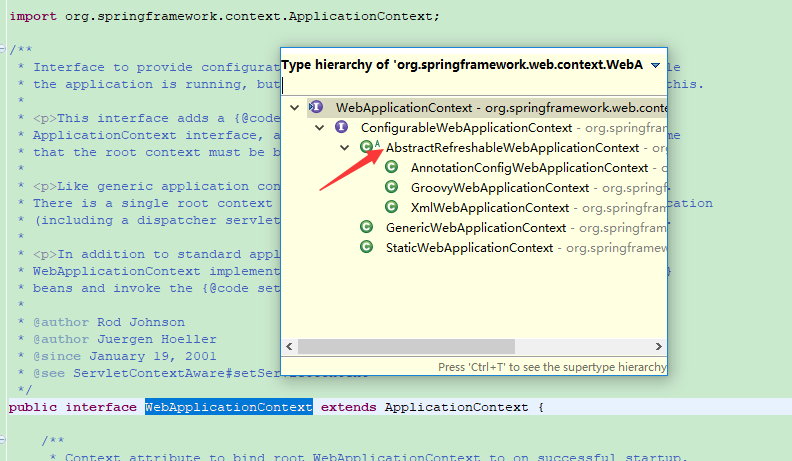<context-param> <param-name>contextConfigLocation</param-name> <param-value> /WEB-INF/config/application-context.xml /WEB-INF/config/cache-context.xml /WEB-INF/config/captcha-context.xml /WEB-INF/config/jeecms/jeecore-context.xml /WEB-INF/config/jeecms/jeecms-context.xml /WEB-INF/config/shiro-context.xml /WEB-INF/config/plug/**/*-context.xml /WEB-INF/config/quartz-task.xml </param-value> </context-param> <listener> <listener-class>org.springframework.web.context.ContextLoaderListener</listener-class> </listener>
spring项目中web.xml都会有这么写配置。
ContextLoaderListener 初始化通过ContextLoaderListener.
那么contextConfigLocation这个属性在哪呢。
public class ContextLoaderListener extends ContextLoader implements ServletContextListener {
@Override
public void contextInitialized(ServletContextEvent event) {
initWebApplicationContext(event.getServletContext());
}
public WebApplicationContext initWebApplicationContext(ServletContext servletContext) { if (servletContext.getAttribute(WebApplicationContext.ROOT_WEB_APPLICATION_CONTEXT_ATTRIBUTE) != null) { throw new IllegalStateException( "Cannot initialize context because there is already a root application context present - " + "check whether you have multiple ContextLoader* definitions in your web.xml!"); } Log logger = LogFactory.getLog(ContextLoader.class); servletContext.log("Initializing Spring root WebApplicationContext"); if (logger.isInfoEnabled()) { logger.info("Root WebApplicationContext: initialization started"); } long startTime = System.currentTimeMillis(); try { // Store context in local instance variable, to guarantee that // it is available on ServletContext shutdown. if (this.context == null) { this.context = createWebApplicationContext(servletContext);
protected WebApplicationContext createWebApplicationContext(ServletContext sc) { Class<?> contextClass = determineContextClass(sc);
protected Class<?> determineContextClass(ServletContext servletContext) { String contextClassName = servletContext.getInitParameter(CONTEXT_CLASS_PARAM); if (contextClassName != null) { try { return ClassUtils.forName(contextClassName, ClassUtils.getDefaultClassLoader()); } catch (ClassNotFoundException ex) { throw new ApplicationContextException( "Failed to load custom context class [" + contextClassName + "]", ex); } } else { contextClassName = defaultStrategies.getProperty(WebApplicationContext.class.getName());

public abstract class AbstractRefreshableWebApplicationContext extends AbstractRefreshableConfigApplicationContext implements ConfigurableWebApplicationContext, ThemeSource {
public abstract class AbstractRefreshableConfigApplicationContext extends AbstractRefreshableApplicationContext implements BeanNameAware, InitializingBean { private String[] configLocations;
ok,
AbstractRefreshableConfigApplicationContext 。。。